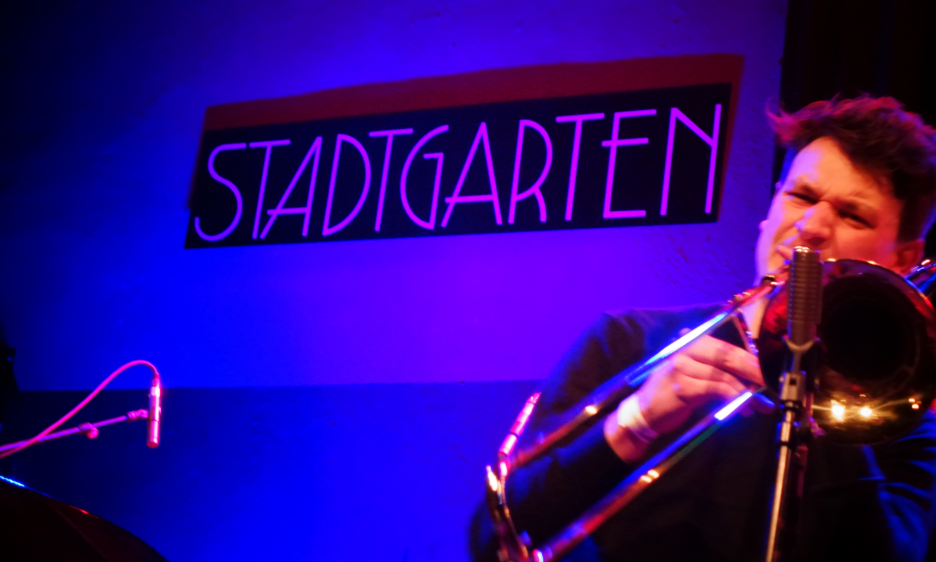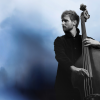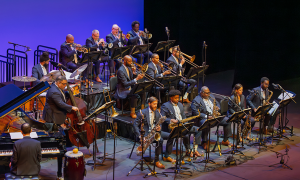Home » Jazz Articles » Live Review » Cologne Open 2018
Cologne Open 2018

Stadtgarten
Cologne, Gemany
March 1-2, 2018
Cologne Open, the first edition of a new showcase festival offering a selection of the city's jazz musicians, spanned two nights in the renowned Stadtgarten venue. It was launched on the occasion of a meeting of the newly established Artistic Exchange Platform (AEP) of Europe Jazz Network at this venue. This report first provides some background information before reviewing the individual musical performances of the two nights. The reader can work his or her way through the background and proceed to the individual concerts or work the other way round.
The first edition of the Cologne scene showcase festival was launched by/at the Cologne Stadtgarten venue to celebrate the newly established Artistic Exchange Platform (AEP) of Europe Jazz Network. The AEP meeting brought together some twenty different artistic directors of Jazz festivals and venues from all over Europe, to discuss the artistic aspects of their programming in order to coordinate and collaborate more tightly on future perspectives.
Stadtgarten is one of the major venues in Cologne besides Loft and Subway. Since its foundation 31 years ago it has developed into a profiled place, presenting and stimulating a broader spectrum of contemporary music. A giant step was its recent transformation into an artistic center fully concentrating on that task. Under the lead of artistic director Reiner Michalke and former artistic director of internationally renowned Moersfestival it has now been upgraded to an European Center of Jazz and Contemporary Music, extra funded by the Federal State and the central German government. The German term "Aktuelle Musik" means "up-to-date music" or "currently relevant music."
The venue Stadtgarten derives from the Initiative Kölner Jazz Haus e.V., which still is the carrier of the center. The original initiative founded its own recording label JazzHausMusik. Later two collectives of younger musicians came into being, the Klaengkollektiv also with its own recoding label and three-days festival in November, and the Impakt Kollektiv that has its recordings on bandcamp. The Klaengkollektiv gathers musicians as drummer Jonas Burgwinkel and bassist Robert Landfermann (the universal rhythm tandem of Germany), pianist Pablo Held, trumpeter Frederik Koster, Die Verwandlung-according to flourishing, deeply ingrained German custom all manifold award winners. There is also the annual Winter Jazz meeting organized by two musicians, saxophonist Angelika Niescier and bassist Ulla Oster, both associated with Stadtgarten.
Showcasing Cologne scene's offspring
Through Cologne, normally one of the warmer regions of Germany, swept a chilling cold wind (from the east) during those two days, converting the city into a strong wintry setting.The focus of the Cologne Open Showcase Festival, two nights with each 5 configurations each in a 30 minutes set, was on Cologne scene's offspring. The first night on Thursday presented the sextet Makkro, the string trio + voice named phase::vier, the brand-new trio Aurora, a solo performance by guitarist Nicola Hein and the Salomea quartet. The second night on Friday had the voice-drum duo Lukasheva/Mahnig, the Enso quartet, the Mengamo power-trio and two solo-performances, one by vocalist Hanna Schörken and one by trumpeter/vocalist Pablo Giw. The program was chosen and presented by German music journalist Hans-Jürgen Linke, long time jury member of the annual Horst-und-Gretel-Will Grant, a Cologne jazz award/grant for young up-and-coming musicians under the age of 30. Four of its awardees participated in the showcase program: pianist Lucas Leidinger (Trio Aurora), vocalist Filippa Gojo (phase::vier), saxophonist Leonard Huhn (Enso) and drummer Dominik Mahnig (duo Lukasheva/Mahning). Awards and grants play an important role in Germany. They turn up as soon as you dig into the background of musicians (see below) and venues.
Strong forces and interconnectedness
The program had noticeable strong forces from Eastern Europe, namely violinist Zuzana Leharova (phase::vier) and vocalist Tamara Lukasheva (Lukasheva/Mahning Duo). There was also a strong vocal component with four vocalists: Filippa Gojo (phase::vier), Rebekka Salomea (Salomea), Hanna Schörken and Pablo Giw.The festival offered multiple appearances by some of the musicians. Drummer Thomas Sauerborn (1987) figured in Makkro and Mengamo Trio as well. Drummer Fabian Arends (1990) figured in Makkro too and in the Aurora trio and bassist Oliver Lutz figured in Makkro as well as in Salomea.
Thomas Sauerborn plays in 12 groups and has strong connections with the Copenhagen scene especially 5e/ILK. He is involved in 12 albums. There is Mount Meander, the Cologne—Copenhagen—unit with Sauerborn (dr), Tomo Jacobson (b) Karlis Auzius from Latvia (sax) and Lucas Leidinger from Cologne (p). The group's eponymous debut album Meander was released in 2016 on Clean Feed. Sauerborn and Leidinger both studied at Rhythmic Music Conservatory in Copenhagen. Fabian Arends is figuring in 10 groups and has 12 albums on his sleeve. He has Berlin-and also Copenhagen-connections as his colleagues Thomas Sauerborn and Lucas Leidinger and even as Sauerborn he is connected to pianist Lucas Leidinger. Lucas Leidinger's Copenhagen connection is manifested on Tomo Jacobson's album Moonbow on ILK, his Berlin connection Shoebill Music (drummer Tilo Weber) and his Belgium connection on Limited Impossibilities (saxophonist Daniel Daemen). He is involved in 11 groups (6 of it as (co)leader) and has 14 albums on his sleeve. And to mention another one: drummer Dominik Mahnig was asked recently to join Simon Nabatov's piano trio with bassist Mark Dresser. Nabatov is a well-known Cologne resident of the older generation. When checking the background and combination of this younger generation of musicians It turns out that the scene is highly interconnected internally but also externally (especially Copenhagen and Berlin) with a gradually opening up European perspective.
First Night
The kick off was for a configuration called Makkro. Makkro is a two plus two plus two gathering joining forces, measuring forces: trombone, keyboards, two basses, two drum sets. It is six young men in search of the(ir) capacities and possibilities (together): Janning Trumann, Christian Lorenzen, David Helm, Oliver Lutz, Fabian Arends and Thomas Sauerborn. Makkro had a lot to offer. It could be regarded an entertaining sophisticated mishmash. You could also long for a unifying quality. In the beginning there was a circular, more complex layering approach, but it didn't carry through compositionally. This gathering of strong members of the Cologne scene offered some interesting insights in its work of progress.Next there were vocal cords plus four times four strings of different length called phase::vier. phase::vier. It is an all female unity consisting of vocalist Filippa Gojo, a strong lead voice, violinist Zuzana Leharová, cellist Elisabeth Coudoux and bassist Svenja Doeinck, This gang of four(s) led the music in captivating ways into completely different waters. Operating in its quite unique format (the full string range) it opened up interesting, surprising and rewarding possibilities underway to find its full core strength and shimmering entwinement.
Trio Aurora, comprising pianist Lucas Leidinger (1988), saxophonist Sebastian Gille (1983) and drummer Fabian Arends (1990) completed the triple pack with an outstanding performance, intensely focused and coherent. It is a new trio that made its first appearance during the last Cologne Winter Jazz in January.
Sebastian Gille, the most experienced of the threesome, moved (from Hamburg) to Cologne only recently. He exemplifies how many jazz awards exist in Germany. Gille is a passionate, intense voice of a highly distinguished bended tone color. His voice coheres vibrantly with the wide sweeping transparent sounds of pianist Lucas Leidinger and the subtle strokes and delicate accents of young drummer extraordinaire Fabian Arends. It is a new collaboration that makes a lot of sense. Causing remarkable new waves the unit created its unique 'klang' profile thereby leaving a strong, indelible mark.
The basement with its Studio 672 became enlivened the first night by the practical musical skepticism of guitarist Nicola Hein and the contrasting charming transmutations of quartet Salomea.
Nicola Hein (1988) is quite a character, the young artist in search of new ways of real time musical creation driven by an attitude of skepticism, as he calls it. "The imagined form of skepsis is one that has to be understood in terms of Gadamer's dialogue ... . It is a self inquiring dialog of musical voices, which enjoy the practice of mutual undermining." (Nicola Hein). Hein operates on a broader scale, from philosophical reasoning to sound generating construction and musical interaction with his instrument, the guitar. He doesn't eschew heavy statements whereas his music comes from the opposite end. Instead of massively and loudly occupying or blowing up space it is often appearing at the fringes of the listening field. It is not so much purposeful and demonstrative, but more a question of finding fruitful accesses from where transient esthetic condensation can emerge. It demands a strict way of listening and having trust in following strange movements. Hein has been involved in collaborations with older generation musicians as John Butcher, Tobias Delius, Rudi Mahall and Paul Lytton as well as younger musicians as Berlin vibraphonist Emilio Gordoa, Amsterdam saxophonist Ada Rave, all documented on an impressing number of 17 albums. The album Nahezu Nicht (Almost Not) with drummer Paul Lytton is a sharp, imaginative manifestation of it. Hein is a driving force in a special segment of the Cologne scene, the quite active Impakt Collective ('Impakt' is a condensed composition of 'improvisation' and 'Aktuelle Musik'/up-to-date music') that also runs an eponymous label.
Salomea, a quartet around singer Rebekka Salomea, is reaching out far into the realms of pop music comparable to Scandinavian groups like Broen, Gurls or Rohey. It happens in a credible way with a highly original, versatile and bending approach. It is attractive, playful music covering a broad range of moods, from otherworldly and dreamy to down to earth and always with cool rhythms keeping it on the pulse of our time. Keyboarder Yannis Anft, electric bassist Oliver Lutz and drummer Leif Berger (his drum strokes, his patting have a great economy and elegance) can function as a clockwork drum machine but they can just as well burst into hot and heavy elaboration (preferably this happens less seriously-looking). It is a band with great potential. Its debut album will be released soon—there are very good reasons to look forward to it and keep an eye/ear on it.
Second Night
The second night took its course with an extraordinary start: a voice-drum duo, a percussion discussion with nuances and twists of the human voice, hands, feet: beating, vibrating, aspirating skin, wood and metal with a dive-and-jive commitment. Tamara Lukasheva in particular, from the illustrious city of Odessa, showed her infectious entertainment talents and combined these with a clear artistic dedication strongly relating to Dominik Mahnig's dedication. Lukesheva moves in her sound-making between trickling sand and scatted grooves and keeps everything narratively together. Mahnig is a highly adaptive percussive magician providing the rustling of the wind, the sloshing of the water, the sighs and shrieks. Both keep the tension curve and come up with surprising turns.In 2017 Lukasheva won the award Neuer Deutscher Jazzpreis with her quartet of pianist Sebastian Scobel, bassist Jakob Kühnemann and drummer Dominik Mahnig (curator Norma Winstone). It is an award of IG Jazz Mannheim. For this award the votes of the audience determine the winner based on three jury proposals. Vocalist Filippa Gojo of phase::vier won the award in 2015 with her own quartet (curator Kenny Garrett). This year the Cologne group Salomea is among the three finalists.
Quartet Enso met the expectant ear of the audience with long concentrated silence—an extension of the famous first four seconds on the recordings of a well-known label from Germany. Via calmly lasting bass drum beats it gradually turned into fuller Klang. It was a clear and demonstrative way of influencing the audience's perception, a new game played together. The group of bassist Stefan Schönegg, saxophonist Leonhard Huhn, cellist Nathan Bontrager and drummer Anthony Greminger intensified this during the concert by halting, interrupting, substituting etc.. The group used it to arrive at a new quality in the interaction of musical process and product in a quite serious way with a rather nice outcome. It is a serious playful thing that at times could /should have shown a bit more light-footedness.
Mengamo Trio, the threesome of electric guitarist Philipp Brämswig, organ player Sebastian Scobel and drummer Thomas Sauerborn, brought a dense form of sophisticated power rock created by a chameleon-like versatility in combination with a strong dose of that special kind of Cologne solidity—something along the lines and transcendent killer quality of Scandinavian power trio Elephant 9 (Ståle Storløkken (keys), Nikolai Eilertsen (b) and Torstein Lofthus (dr))? Not quite yet. It is up to these three excellent musicians to dig up their very own rugged appeal on a deeper level.
The night was concluded by two vocalist-solos, the first by Hanna Schörken, the second by Pablo Giw. Hanna Schörken has a strong affinity for the lighter layers and the vapor of sung music in different styles and genres (there are certain Anklänge an/echoes of Robert Wyatt's singing). Catching these, twisting, turning, extending and reassembling them as playful particles that is the game she plays, shifting between elusive and visceral, between brittle and softly glowing. She is on her way to cohere this in an impacting way in appropriate contexts. Pablo Giw's performance shifted between pure vocal work, vocalizing via the trumpet using looping and microphone distortion. He performed, highly engaged, with a lot of different attacks and forms of expression; a work in progress with loose ends, that still has to develop into a smoldering interaction between engagement and distance to position itself in a strong space and trace of resonance.
Conclusion/Schlussfolgerung
The showcases of Cologne Open offered some possibilities to get acquainted with up-and-coming younger forces in the Cologne scene and find pathways in/through that extended rich scene (for more insights, read my article on WDR3 Jazzfest 2018). It turns out that musicians nowadays are part of a web: the branching of his/her own groups/combinations as leader and side person, the interconnection of different strengths between groups in the scene and outside the local scene.Nowadays musicians function in those networks as many-sided artists, attracting, stimulating and influencing each other, resulting in the emergence of certain contours, characteristics and profiles as in the Cologne scene. All musicians/groups of the showcases showed great skills and creativity and a certain degree of originality. The certain something of some musicians or groups—like Trio Aurora -lies in the uncompromised way a musician/group goes for a sound expression, a musical vision based on trusting his/her very own deep intuition, keeping that compass working, following the trace, allowing the music itself to emerge/unfold. The quality of music is—amongst other things—a resultant of the specific ratio of space and energy as well as a specific ratio of exactness, attractiveness, boldness and mysteriousness.
Tags
Live Reviews
Henning Bolte
Germany
Cologne
Jonas Burgwinkel
Robert Landfermann
Pablo Held
Frederik Köster
Angelika Niescier
Ulla Oster
Lucas Leidinger
Filippa Gojo
Leonard Huhn
Dominik Mahnig
Tamara Lukasheva
Hanna Schörken
Pablo Giw
Thomas Sauerborn
Fabian Arends
Oliver Lutz
Simon Nabatov
Mark Dresser
Janning Trumann
Christian Lorenzen
David Helm
Zuzana Leharová
Elisabeth Coudoux
Svenja Doeinck
Sebastian Gille
Nicola Hein
John Butcher
Tobias Delius
Rudi Mahall
Paul Lytton
Emilio Gordoa
Ada Rave
Rebekka Salomea
Yannis Anft
Leif Berger
Sebastian Scobel
Jakob Kühnemann
Norma Winston
Kenny Garrett
Stefan Schönegg
Nathan Bontrager
Anthony Greminger
Philipp Brämswig
Ståle Storløkken
Nikolai Eilertsen
Torstein Lofthus
PREVIOUS / NEXT
Support All About Jazz
 All About Jazz has been a pillar of jazz since 1995, championing it as an art form and, more importantly, supporting the musicians who make it. Our enduring commitment has made "AAJ" one of the most culturally important websites of its kind, read by hundreds of thousands of fans, musicians and industry figures every month.
All About Jazz has been a pillar of jazz since 1995, championing it as an art form and, more importantly, supporting the musicians who make it. Our enduring commitment has made "AAJ" one of the most culturally important websites of its kind, read by hundreds of thousands of fans, musicians and industry figures every month.
Go Ad Free!
To maintain our platform while developing new means to foster jazz discovery and connectivity, we need your help. You can become a sustaining member for as little as $20 and in return, we'll immediately hide those pesky ads plus provide access to future articles for a full year. This winning combination vastly improves your AAJ experience and allow us to vigorously build on the pioneering work we first started in 1995. So enjoy an ad-free AAJ experience and help us remain a positive beacon for jazz by making a donation today.Near
Cologne Concerts
Feb
17
Tue
Feb
22
Sun



























